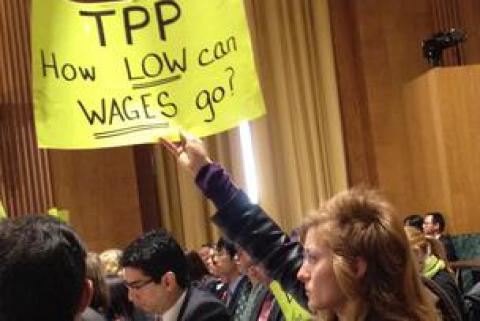By Jeanne Cummings
Unions may be weaker, smaller and more embattled, but
they remain crucial players in Democratic politics. When wealthy
Republicans began pouring millions into super-PACs in 2010, unions
worked to shield Democratic candidates from the onslaught, becoming
their biggest source of super-PAC donations.
What is that loyalty worth? With President Barack Obama and Congress
negotiating fast-track legislation on international trade, union leaders
are about to find out.
Renewal of the president's "fast-track" authority would limit
congressional influence over trade pacts negotiated by the
administration, protecting trade agreements from being filibustered or
amended.
The conflict over fast track is fundamental. Organized labor wants to
kill the legislation. Obama wants to sign it. The rough outlines of the
bill would enable Congress to make its preferences known and receive
updates while trade negotiations are under way in exchange for a clean
vote -- no amendments -- on a final trade agreement.
Even as the White House pushes for fast track, it is negotiating the
Trans-Pacific Partnership, an agreement to facilitate trade among the
U.S., Australia, Japan and other Pacific Rim nations. Japan insists on
fast-track's approval before finalizing a deal.
Labor leaders argue that U.S. workers have lost jobs due to prior trade
agreements, including the North American Free Trade Agreement and others
with Caribbean nations, Colombia and Korea. Factories and jobs have
moved overseas to countries with low wages and minimal environmental
standards. Meanwhile corporate profits in recent years have been strong
while wages have stagnated. And the number of Americans who say the
nation is on the wrong track remains high.
Business leaders in industries as diverse as technology and agriculture
counter that lower tariffs and streamlined customs would enable U.S.
companies to increase exports and create more domestic jobs.
Unions including the AFL-CIO, Service Employees International Union and
Teamsters last month ratcheted up pressure on Democrats, suspending
donations to federal super-PACs "until further notice." Essentially, the
unions have opted to sit on the political sidelines until the direction
of the legislative fight is clear. The donation freeze affects House,
Senate and presidential political committees, including one gearing up
to back Hillary Clinton, said one labor official.
Unions donated $166 million between 2010 and 2014 to two Democratic
congressional super-PACs. Of $47 million raised by the Senate Majority
PAC in 2014, $15 million came from labor unions, making them
collectively the committee's second largest donor. Unions contributed
$11 million to the House Majority PAC's $30 million kitty in 2014, tying
the financial industry as top donor.
By contrast, Karl Rove's American Crossroads super-PAC, just one of a
half dozen major Republican super-PACs operating in recent elections,
collected $176 million between 2010 and 2014. The Republican advantage,
which grows significantly when anonymous donations are included, only
underscores how important labor's contributions are to Democrats.
If fast track legislation goes through, labor could withhold donations
from Senate and House super-PACs. Thus party leaders wouldn't be
funneling union money to lawmakers who voted for fast-track authority or
TPP. Union leaders could even try to punish wayward Democrats in a
Democratic primary fight.
However, unions have made similar threats in the past with little
result. "It's a little bit like Obama and chemical weapons," said former
SEIU President Andy Stern. "What you do when someone crosses the lines
establishes whether people think these lines are real or not."
To contact the author on this story: Jeanne Cummings at


Spread the word